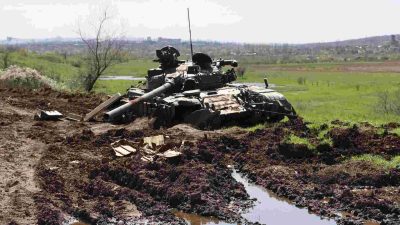Zelensky Admits Progress in Counteroffensive “Slower Than Desired”, Divisions within NATO

All Global Research articles can be read in 51 languages by activating the Translate Website button below the author’s name.
To receive Global Research’s Daily Newsletter (selected articles), click here.
Click the share button above to email/forward this article to your friends and colleagues. Follow us on Instagram and Twitter and subscribe to our Telegram Channel. Feel free to repost and share widely Global Research articles.
***
In an interview released by the BBC on June 21, Ukrainian President Volodymyr Zelensky acknowledged that progress on the battlefield against Russian forces is “slower than desired” and said “some people believe this is a Hollywood movie and expect results now.” The Ukrainian president also reaffirmed that Kiev seeks to become a member of NATO and will not talk to anyone about ending the conflict while Russian troops are in what he considers Ukrainian territory.
Ukraine says its counter-offensive has captured eight villages in the southern Zaporozhye and Donetsk region. However, this has not been independently verified. Zelensky has stated that Ukrainian troops have not advanced further because “200,000 square kilometres of territory have been mined by Russian forces.”
The president reinforced the need for Kiev to receive security guarantees from NATO, adding that the ultimate goal is to become a military alliance member. Atlantic Alliance Secretary General Jens Stoltenberg made it clear this week that no plans were on the table to extend an invitation to Kiev at next month’s summit in Lithuania.
“[Jens] Stoltenberg knows my position. We’ve told them numerous times: ‘Don’t knock the ground from under our feet,” Zelensky said.
He also reaffirmed that he would not sit down with Russian President Vladimir Putin or anyone else to negotiate an end to the conflict unless Russian troops leave Ukrainian territory.
“No matter how far we advance in our counter-offensive, we will not agree to a frozen conflict because that is war, a prospectless development for Ukraine,” he added.
In the same manner, Stoltenberg spoke out on June 18 against the freezing of the Ukrainian conflict, as well as against its conclusion on Russian terms.
“We all want this war to end. But for peace to be sustainable, it must be just. Peace cannot mean freezing the conflict and accepting a deal dictated by Russia,” Stoltenberg told the German newspaper Welt am Sonntag on June 18. “NATO is no party to the conflict. We stand by Ukraine in its right to self-defence, enshrined in the UN Charter.”
Stoltenberg’s claim of NATO not being a party to the conflict was quickly rejected by Sergey Lavrov, with the Russian foreign minister highlighting that alliance members admitted: “that without pumping the Ukrainian regime with weapons, without providing Kiev with intelligence data from satellites, the Ukrainian situation would have been over a long time ago, this is actually recognition of their direct involvement in the hybrid and even hot war declared against Russia.”
According to the NATO Secretary General, the alliance will continue to support Ukraine. This will prove difficult as senior officials in Western countries have repeatedly identified low inventories and production levels as impediments to further support for Kiev.
Besides, despite the bravado from Zelensky and Stoltenberg, Ukrainian Deputy Defence Minister Ganna Maliar said on social media that “the situation in the east is now difficult” as Russia has not given up on controlling all of Donbass. She, just like Zelensky did when delivering the news of a “slower than desired” offensive, tried to add a positive spin by saying that “[Ukraine does] not allow the enemy to advance.”
No matter how much Kiev tries to extol the successes of the Ukrainian army, its counteroffensive is slow, and there certainly cannot be any talk of a final victory. It is likely that the war, at some point, will grind out and freeze despite Zelensky’s and Stoltenberg’s promises that this will not eventuate.
In this situation, Ukraine will likely receive an empty promise of NATO membership so that Zelensky can make losing the war more palatable for Ukrainians. Such a promise is worth little because, according to the Washington Treaty, the decision to join NATO must be unanimous. Ukraine must also fulfil a series of conditions that it will probably not be able to do for a long time.
Ahead of the NATO summit on July 11 in Vilnius, Ukraine is doing its best to create the impression that it has launched a victorious offensive, which will inevitably lead to a final victory. Kiev is trying to convince its Western backers of the myth of an invincible Ukrainian army, but these so-called successes are very dubious.
Earlier, Zelensky said Ukraine hopes to receive a clear invitation to join the bloc at the NATO summit in Vilnius in July. Although the process usually takes years, Kiev points to an accelerated EU accession process and hopes to start accession negotiations as early as this year, but faces opposition from some members of the 27-nation bloc. And it is here where its NATO membership, just like the eventual course of the war, will freeze.
*
Note to readers: Please click the share button above. Follow us on Instagram and Twitter and subscribe to our Telegram Channel. Feel free to repost and share widely Global Research articles.
Ahmed Adel is a Cairo-based geopolitics and political economy researcher.
Featured image is from InfoBrics

